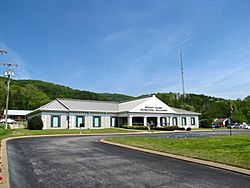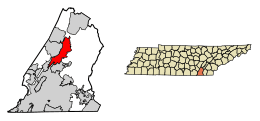Soddy-Daisy, Tennessee facts for kids
Quick facts for kids
Soddy-Daisy, Tennessee
|
|
|---|---|

Soddy-Daisy City Hall
|
|

Location of Soddy-Daisy in Hamilton County, Tennessee
|
|
| Country | United States |
| State | Tennessee |
| County | Hamilton |
| Incorporated | 1969 |
| Area | |
| • Total | 24.04 sq mi (62.26 km2) |
| • Land | 23.18 sq mi (60.02 km2) |
| • Water | 0.86 sq mi (2.24 km2) |
| Elevation | 699 ft (213 m) |
| Population
(2020)
|
|
| • Total | 13,070 |
| • Density | 563.97/sq mi (217.75/km2) |
| Time zone | UTC-5 (Eastern (EST)) |
| • Summer (DST) | UTC-4 (EDT) |
| ZIP codes |
37379, 37384
|
| Area code(s) | 423 |
| FIPS code | 47-69560 |
| GNIS feature ID | 1270798 |
Soddy-Daisy is a city located in Hamilton County, Tennessee, in the United States. In 2020, about 13,070 people lived there. The city was created in 1969 when two smaller communities, Soddy (in the north) and Daisy (in the south), joined together. These areas were located along U.S. Route 27.
Soddy-Daisy is becoming a "bedroom community" for nearby Chattanooga. This means many people who live in Soddy-Daisy travel to Chattanooga for work. The city is part of the larger Chattanooga metropolitan area. The Sequoyah Nuclear Generating Station, a power plant, is also located in Soddy-Daisy.
History of Soddy-Daisy
Soddy-Daisy is an official city that was formed by combining the older towns of Soddy and Daisy.
Poe's Tavern and Early History
Soddy-Daisy was once home to the very first courthouse and government center for Hamilton County. This important building was called Poe's Tavern. It was built in 1819 and belonged to a local resident named Hasten Poe.
In 1838, Poe's Tavern was a stop for about 1,900 Cherokee people. They were on the Trail of Tears, a sad journey where many Native Americans were forced to move from their homes. Later, during the American Civil War (1861-1865), Poe's Tavern was used as a hospital. Both Union and Confederate soldiers received care there. The original tavern was taken down in 1911. However, the city of Soddy-Daisy has built a copy of the building close to where the first one stood.
How Soddy Got Its Name
There are two main stories about how the town of Soddy got its name:
- Some people believe "Soddy" comes from the Cherokee word Tsati. This word refers to the Koasati people, a Native American group who lived in the area before the Cherokee arrived.
- Another idea is that Soddy was named after William Sodder. He ran a trading post in the town.
- Some also think the name comes from Soddy Creek, which might have gotten its name from the Cherokee word Sauta.
Soddy was a very small town until the Soddy Coal Company started mining for coal there in 1867.
How Daisy Got Its Name
It is thought that the town of Daisy was named after Daisy Parks. She was the daughter of Thomas Parks, who was important in the coal industry. Thomas Parks started the Daisy Coal Company in 1881.
The two towns, Soddy and Daisy, officially became one city in April 1969. They joined along a 9-mile (14 km) stretch of U.S. Route 27.
Geography and Location
Soddy-Daisy is located in the northern part of Hamilton County. Its southwestern edge touches the city of Chattanooga. Other nearby communities include Middle Valley, Falling Water, Mowbray Mountain, and Flat Top Mountain.
The city covers about 23.5 square miles (60.7 square kilometers) of land. About 0.8 square miles (2.1 square kilometers) is water.
Natural Features
Soddy-Daisy sits at the bottom of the Cumberland Escarpment. This is the eastern side of Walden Ridge, which is part of the Cumberland Plateau. An arm of Chickamauga Lake is to the east. This part of the lake is formed by the lower section of Soddy Creek.
Transportation
U.S. Route 27 is the main highway in Soddy-Daisy. It connects the city to Chattanooga, which is about 16 miles (26 km) to the south. It also connects to Dayton, about 22 miles (35 km) to the northeast. State Route 111 crosses Walden Ridge and goes northwest to Dunlap, about 17 miles (27 km) away. This route meets US-27 in the northern part of Soddy-Daisy.
The area is also known for the Stone Fort bouldering area, a popular spot for rock climbing.
Population Information
| Historical population | |||
|---|---|---|---|
| Census | Pop. | %± | |
| 1970 | 7,569 | — | |
| 1980 | 8,388 | 10.8% | |
| 1990 | 8,240 | −1.8% | |
| 2000 | 11,530 | 39.9% | |
| 2010 | 12,714 | 10.3% | |
| 2020 | 13,070 | 2.8% | |
| Sources: | |||
Population in 2020
In 2020, the city of Soddy-Daisy had 13,070 people living there. There were 5,628 households and 3,378 families.
| Race | Number | Percentage |
|---|---|---|
| White (non-Hispanic) | 11,867 | 90.8% |
| Black or African American (non-Hispanic) | 137 | 1.05% |
| Native American | 27 | 0.21% |
| Asian | 44 | 0.34% |
| Pacific Islander | 3 | 0.02% |
| Other/Mixed | 596 | 4.56% |
| Hispanic or Latino | 396 | 3.03% |
Education and Learning
Soddy-Daisy has several schools for students of different ages.
Schools in Soddy-Daisy
There are seven schools in the area:
- Allen Elementary
- Daisy Elementary
- Soddy Elementary
- Ivy Academy
- Soddy-Daisy Middle
- Soddy-Daisy High School
- Sequoyah High School
Community Library
Soddy-Daisy has a community library that is run by local people. It opened in 2018. Residents, businesses, and groups helped to create it because there had not been a public library in Soddy-Daisy for many years.
Local Museum
The city also has a museum that opened in 2017. It is managed by the city's historical association. The museum is located in a former bank building that is 100 years old. It has exhibits that show and teach about the history of the Soddy-Daisy area. The historical association also holds an annual history fair at Soddy-Daisy High School every January.
Media and Notable People
Local Radio Station
Soddy-Daisy has one local radio station, WGOW-FM, that is licensed to broadcast from the community.
Famous People from Soddy-Daisy
Some well-known people have come from Soddy-Daisy:
- Joe Chaney, a darts player
- Ron Cox, a racing car driver
- Terry Gordy, a professional wrestler
- Bryan Harvey, a former baseball pitcher for Major League Baseball
- Ralph McGill, a journalist
Images for kids
Error: no page names specified (help). In Spanish: Soddy-Daisy para niños
In Spanish: Soddy-Daisy para niños
 | Mary Eliza Mahoney |
 | Susie King Taylor |
 | Ida Gray |
 | Eliza Ann Grier |



